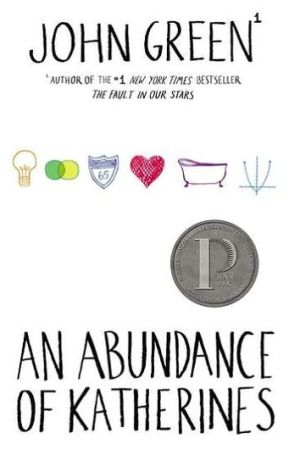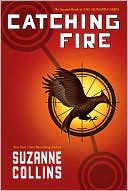Abundance of Katherines
From the #1 bestselling author of The Fault in Our Stars \ Michael L. Printz Honor Book\ Los Angeles Times Book Prize Finalist\ Katherine V thought boys were gross Katherine X just wanted to be friends Katherine XVIII dumped him in an e-mail K-19 broke his heart\ When it comes to relationships, Colin Singleton's type happens to be girls named Katherine. And when it comes to girls named Katherine, Colin is always getting dumped. Nineteen times, to be exact.\ On a road trip miles...
Search in google:
When it comes to relationships, Colin Singleton's type is girls named Katherine. And when it comes to girls named Katherine, Colin is always getting dumped. Nineteen times, to be exact. On a road trip miles from home, this anagram-happy, washedup child prodigy has ten thousand dollars in his pocket, a bloodthirsty feral hog on his trail, and an overweight, Judge Judy—loving best friend riding shotgun—but no Katherines. Colin is on a mission to prove The Theorem of Underlying Katherine Predictability, which he hopes will predict the future of any relationship, avenge Dumpees everywhere, and finally win him the girl. Love, friendship, and a dead Austro-Hungarian archduke add up to surprising and heart-changing conclusions in this ingeniously layered comic novel about reinventing oneself.Publishers WeeklyThough Woodman did a strong job on the audio version of Green's Looking for Alaska (see above), the author's second young adult novel proves to be more of a challenge. This follow-up is looser and less traditionally structured, more in the postmodern vein, without a sad and lovable heroine for a narrator to wrap his energies around. There's a much nerdier element to Green's latest hero, teenage prodigy Colin Singleton, and not as much understandable or likeable weirdness in the other characters. Despite these shortcomings, Woodman does manage to carve out a narrow turf of credibility and interest, where young adults who enjoy being tested by their entertainment choices might find some moments of pleasure. Ages 12-up. (Oct.) Copyright 2006 Reed Business Information.
(one)\ The morning after noted child prodigy Colin Singleton graduated from high school and got dumped for the nineteenth time by a girl named Katherine, he took a bath. Colin had always preferred baths; one of his general policies in life was never to do anything standing up that could just as easily be done lying down. He climbed into the tub as soon as the water got hot, and he sat and watched with a curiously blank look on his face as the water overtook him. The water inched up his legs, which were crossed and folded into the tub. He did recognize, albeit faintly, that he was too long, and too big, for this bathtub-he looked like a mostly grown person playing at being a kid. As the water began to splash over his skinny but unmuscled stomach, he thought of Archimedes. When Colin was about four, he read a book about Archimedes, the Greek philosopher who'd discovered that volume could be measured by water displacement when he sat down in the bathtub. Upon making this discovery, Archimedes supposedly shouted "Eureka!" [1] and then ran naked through the streets. The book said that many important discoveries contained a "Eureka moment." And even then, Colin very much wanted to have some important discoveries, so he asked his mom about it when she got home that evening.\ "Mommy, am I ever going to have a Eureka moment?"\ "Oh, sweetie," she said, taking his hand. "What's wrong?"\ "I wanna have a Eureka Moment," he said, the way another kid might have expressed longing for a Teenage Mutant Ninja Turtle.\ She pressed the back of her hand to his cheek and smiled, her face so close to his that he could smell coffee and makeup. "Of course, Colin baby. Of course you will."\ But mothers lie. It's in the job description.\ Colin took a deep breath and slid down, immersing his head. I am crying, he thought, opening his eyes to stare through the soapy, stinging water. I feel like crying, so I must be crying, but it's impossible to tell because I'm underwater. But he wasn't crying. Curiously, he felt too depressed to cry. Too hurt. It felt as if she'd taken the part of him that cried.\ He opened the drain in the tub, stood up, toweled off, and got dressed. When he exited the bathroom, his parents were sitting together on his bed. It was never a good sign when both his parents were in his room at the same time. Over the years it had meant:\ 1. Your grandmother/grandfather/Aunt-Suzie-whom-you-never-met-but-trust- me-she-was-nice-and-it's-a-shame is dead.\ 2. You're letting a girl named Katherine distract you from your studies.\ 3. Babies are made through an act that you will eventually find intriguing but for right now will just sort of horrify you, and also sometimes people do stuff that involves baby-making parts that does not actually involve making babies, like for instance kiss each other in places that are not on the face.\ It never meant:\ 4. A girl named Katherine called while you were in the bathtub. She's sorry. She still loves you and has made a terrible mistake and is waiting for you downstairs.\ But even so, Colin couldn't help but hope that his parents were in the room to provide news of the Number 4 variety. He was a generally pessimistic person, but he seemed to make an exception for Katherines: he always felt they would come back to him. The feeling of loving her and being loved by her welled up in him, and he could taste the adrenaline in the back of his throat, and maybe it wasn't over, and maybe he could feel her hand in his again and hear her loud, brash voice contort itself into a whisper to say I-love-you in the very quick and quiet way that she had always said it. She said I love you as if it were a secret, and an immense one.\ His dad stood up and stepped toward him. "Katherine called my cell," he said. "She's worried about you." Colin felt his dad's hand on his shoulder, and then they both moved forward, and then they were hugging.\ "We're very concerned," his mom said. She was a small woman with curly brown hair that had one single shock of white toward the front. "And stunned," she added. "What happened?"\ "I don't know," Colin said softly into his dad's shoulder. "She's just- she'd had enough of me. She got tired. That's what she said." And then his mom got up and there was a lot of hugging, arms everywhere, and his mom was crying. Colin extricated himself from the hugs and sat down on his bed. He felt a tremendous need to get them out of his room immediately, like if they didn't leave he would blow up. Literally. Guts on the walls; his prodigious brain emptied out onto his bedspread.\ "Well, at some point we need to sit down and assess your options," his dad said. His dad was big on assessing. "Not to look for silver linings, but it seems like you'll now have some free time this summer. A summer class at Northwestern, maybe?"\ "I really need to be alone, just for today," Colin answered, trying to convey a sense of calm so that they would leave and he wouldn't blow up. "So can we assess tomorrow?"\ "Of course, sweetie," his mom said. "We'll be here all day. You just come down whenever you want and we love you and you're so so special, Colin, and you can't possibly let this girl make you think otherwise because you are the most magnificent, brilliant boy-" And right then, the most special, magnificent, brilliant boy bolted into his bathroom and puked his guts out. An explosion, sort of.\ "Oh, Colin!" shouted his mom.\ "I just need to be alone," Colin insisted from the bathroom. "Please." When he came out, they were gone.\ For the next fourteen hours without pausing to eat or drink or throw up again, Colin read and reread his yearbook, which he had received just four days before. Aside from the usual yearbook crap, it contained seventy-two signatures. Twelve were just signatures, fifty-six cited his intelligence, twenty-five said they wished they'd known him better, eleven said it was fun to have him in English class, seven included the words "pupillary sphincter," [2] and a stunning seventeen ended, "Stay Cool!" Colin Singleton could no more stay cool than a blue whale could stayskinny or Bangladesh could stayrich. Presumably, those seventeen people were kidding. He mulled this over-and considered how twenty-five of his classmates, some of whom he'd been attending school with for twelve years, could possibly have wanted to "know him better." As if they hadn't had a chance.\ But mostly for those fourteen hours, he read and reread Katherine XIX's inscription:\ Col,\ Here's to all the places we went. And all the places we'll go. And here's me, whispering again and again and again and again: iloveyou.\ yrs forever, K-a-t-h-e-r-i-n-e\ Eventually, he found the bed too comfortable for his state of mind, so he lay down on his back, his legs sprawled across the carpet. He anagrammed "yrs forever" until he found one he liked: sorry fever. And then he lay there in his fever of sorry and repeated the now memorized note in his head and wanted to cry, but instead he only felt this aching behind his solar plexus. Crying adds something: crying is you, plus tears. But the feeling Colin had was some horrible opposite of crying. It was you, minus something. He kept thinking about one word-forever-and felt the burning ache just beneath his rib cage.It hurt like the worst ass-kicking he'd ever gotten. And he'd gotten plenty.\ (1) Greek: "I have found it."\ (2) More on that later.
\ Publishers WeeklyThough Woodman did a strong job on the audio version of Green's Looking for Alaska (see above), the author's second young adult novel proves to be more of a challenge. This follow-up is looser and less traditionally structured, more in the postmodern vein, without a sad and lovable heroine for a narrator to wrap his energies around. There's a much nerdier element to Green's latest hero, teenage prodigy Colin Singleton, and not as much understandable or likeable weirdness in the other characters. Despite these shortcomings, Woodman does manage to carve out a narrow turf of credibility and interest, where young adults who enjoy being tested by their entertainment choices might find some moments of pleasure. Ages 12-up. (Oct.) Copyright 2006 Reed Business Information.\ \ \ \ \ VOYA - Lorraine Squires\ Colin Singleton, child prodigy, has just been dumped by Katherine XIX-the nineteenth girl named Katherine whom Colin has loved and lost. To help him get over his anguish, Colin's friend Hassan suggests a road trip. They end up in Gutshot, Tennessee, the final resting place of the Archduke Franz Ferdinand and home to Lindsey Lee Wells and her mother, Hollis, who promptly hires the two boys to record the oral histories of her employees at Gutshot Textiles. Meanwhile in his quest to simultaneously win back Katherine XIX and make the leap from prodigy to genius, Colin devises the Theorem of Underlying Katherine Predictability, a mathematical formula that can predict the future of a romantic relationship between any two people. This sweet and earnest follow-up to Green's Printz Award-winning Looking for Alaska (Dutton, 2005/VOYA April 2005) tackles many of the same themes-love, friendship, memory-with a lighter touch. Colin, Hassan, and Lindsey Lee are well-drawn, memorable characters, and the friendship between the boys is both touching and hilarious. Dialogue and plot flow together beautifully, enlivened by foreign languages, equations, and expository footnotes. It also includes an entertaining appendix explaining the theorem. Despite some weak points, most notably the odd side plot involving Hollis and the textiles company, it is an enjoyable, thoughtful novel that will attract readers interested in romance, math, or just good storytelling. It is highly recommended for public and high school libraries.\ \ \ KLIATTDumped by the latest in a series of girlfriends named Katherine, 17-year-old Colin, a former child prodigy, heads out on a recuperative road trip with his friend Hassan. They travel south from Chicago and end up in a small town in Tennessee, where they meet a girl named Lindsey Lee whose mother hires them to record oral histories of the townspeople. All the while Colin labors away at his Theorem, a mathematical formula that will predict which person in a romantic relationship will dump the other. Various misadventures, including a zany pig hunt, help Colin let go of expectations, understand himself and others better, and finally fall for a girl who isn't named Katherine. This comic novel is different in tone from Green's tragic Printz Medal-winning YA novel, Looking for Alaska, but similar in that it also features witty dialog and a smart, engaging cast of characters. Sophisticated teens will enjoy the wordplay and the warm friendships portrayed. The text is augmented by footnotes and graphs, and an appendix explains the math, in case readers are interested. Some sex and profanity. KLIATT Codes: SA--Recommended for senior high school students, advanced students, and adults. 2006, Penguin, Dutton, 240p., $16.99.. Ages 15 to adult. \ —Paula Rohrlick\ \ \ \ \ Children's LiteratureUnlikely as it is for a nerdy, anagram-crazy child prodigy to have had nineteen romantic relationships with girls named Katherine by the time he graduates high school, this is the premise of this engaging novel, and Green makes it believable. This is no small feat, as the story is full of tall-tale elements, as the protagonist, Colin Singleton, embarks on a freewheeling road trip with his best friend, Hassan. The trip takes the two young men from Chicago to a tiny Tennessee town where the locals accept the Lebanese Muslim Hassan (who often introduces himself by saying "I'm not a terrorist"), a woman offers Colin and Hassan a meal, a job, and living quarters in her bubble-gum pink mansion, and the woman's daughter, Lindsey, becomes Colin's first non-Katherine romantic relationship. Woven in with these plot threads are Colin's efforts to grow from being a prodigy to a full-fledged genius by creating a mathematical formula (called the Theorem of Underlying Katherine Predictability) that will prove the future of any romantic relationship, and Hassan's desire to avoid going to college so that he can focus on the two loves of his life—Judge Judy and eating. It's all over the top, and yet the story is convincing. The characters are odd, but appealing. The dialogue is quick and clever. Colin's growing insights about himself and relationships and what matters in life feel true. Green adds even more interest by including quirky footnotes in the text. An appendix elaborates on Colin's mathematical theorem.\ \ \ \ \ School Library JournalGr 9 Up-Printz medalist John Green's main character in this novel (Dutton, 2006) is a loner who has a hard time making friends (though no trouble finding girlfriends) and a quirky taste for anagrams and odd facts. At the end of his senior year of high school, Colin Singleton has just been dumped by a girl named Katherine (it's the 19th time he's been dumped). Stuck in a quagmire of indecision about his future and egged on by his friend Hassan, Colin sets out on an aimless road trip until his attention is caught by a sign for the burial place of Archduke Franz Ferdinand in the middle of rural Tennessee. Colin and Hassan find friends, jobs, and fulfill Colin's quest to understand why he is always being dumped by his girlfriends. He develops a mathematical theorem that focuses on predicting the outcome of romantic relationships. Along the way, there is plenty of humor in the story. Narrator Jeff Woodman creates a distinct and lively persona for each character, complete with accents and inflections. Colin's uniquely na ve attributes combine with his obvious intelligence and checkered romantic past to create a character that Woodman brings to life quite vividly. The math angle and humorous anagrams may create additional interest for some teens. Although the story line is a bit thin, the plot's identity concerns make this an interesting choice for high school and public library collections for older teens.-Jane P. Fenn, Corning-Painted Post West High School, NY Copyright 2006 Reed Business Information.\ \ \ \ \ Kirkus ReviewsColin Singleton, child prodigy, tries to turn his 19 failed encounters with girls named Katherine into a formula that will predict the outcome of all relationships and elevate him to genius status. He and best friend Hassan take a somewhat non-traditional post-graduation road trip and end up in Gutshot, Tenn., guests of the owner of a factory that makes strings for tampons. Colin's wit, anagrams and philosophical quest for order combine with Lebanese Hassan's Muslim heritage and stand-up comedy routines to challenge the macho posturing of local youth, who are friends of Lindsey, the daughter of their hostess. When the boys are hired to collect oral histories of the town, their attachment to the small-town folk is cemented by cruising main street and hunting wild boar. Relationships develop, as does Colin, whom Lindsey somehow manages to teach how to tell a story, a skill truly lacking earlier. Sustaining the mood of giddy fun and celebratory discovery, Green omits the dark moments and bleak tragedy of his Printz Award-winning debut, Looking for Alaska (2005). There are tender tearful moments of romance and sadness balanced by an ironic tone and esoteric footnotes along with complex math. Fully fun, challengingly complex and entirely entertaining. (Fiction. YA)\ \








